Broadcom has discontinued VMware's ESXi hypervisor's free version, as revealed in a recent knowledge base article. The tool has been removed from VMware.com, with Broadcom also terminating perpetual licensing and marking the Free ESXi Hypervisor as EOGA (End of General Availability). This decision impacts users who relied on the free version for testing and tinkering purposes, potentially leading to a gap in VMware skills in the future.
Broadcom ditches of VMware's Partner Programs sparks uncertainty among Cloud Services Providers
Previously, an exclusive report revealed that Broadcom is making significant changes to VMware's partner programs, particularly impacting its Cloud Services Providers (CSPs). Sources familiar with the matter indicate that Broadcom, following its $69 billion acquisition of VMware in November 2023, is overhauling the structure of the business, dividing it into multiple Broadcom divisions. This restructuring includes discontinuing VMware's channel program, with some solution providers and resellers transitioning to Broadcom's scheme on an invitation-only basis starting February.
However, while a part of VMware's channel was informed of this transition, a separate notice was sent to Cloud Services Providers, notifying them of the termination of their program by the end of April. The CSP program enables service providers, including smaller cloud operators, to offer VMware-based cloud services. In the letter, Broadcom states that as of April 30, 2024, the ability to transact as a VMware Cloud Services Provider under the VMware Partner Connect Program will e. The letter also suggests that affected providers may have the opportunity to join the Broadcom Expert Advantage Partner Program, with invitations expected to be sent out in early 2024.
This abrupt change has left many service providers in the dark, uncertain about their future partnership with Broadcom and how it will impact on their customers. Some fear that Broadcom is only interested in retaining its largest and most profitable customers, neglecting smaller users and the providers serving them. There are concerns that only a fraction of VMware's biggest CSPs will be invited to join the new master program.
Notably, in December 2023, Broadcom announced in a post that certain VMware products would transition from perpetual licensing to a subscription-based model.
To explain this change, we can look back at the 2021 Go-to-Market plan. Broadcom informed investors of actively pursuing 600 strategic accounts, primarily targeting the top 3 tiers of the pyramid, because they are often in highly regulated industries, therefore risk-averse, and unlikely to change suppliers.
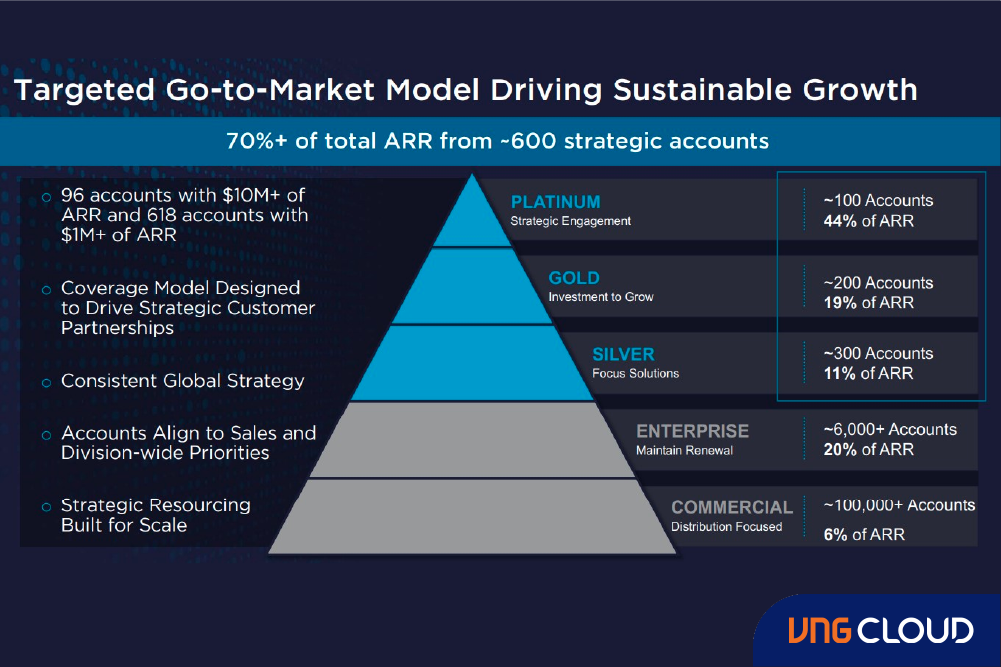
Industry analysts speculate that Broadcom's move may be aimed at consolidating VMware's offerings and aligning them more closely with Broadcom's overall long-term strategy. This aggressive approach could result in further changes throughout 2024.
The sudden termination of the CSP program raises questions about the fate of hundreds, if not thousands, of customers relying on VMware cloud services. With little notice and minimal details provided, service providers are scrambling to understand the implications and communicate with their customers.
Despite regulatory scrutiny during Broadcom's acquisition of VMware, concerns about stifling competition in the cloud market persist. The irony is apparent as Broadcom previously argued that the merger would foster more competition. However, the practical outcome seems to be a potential consolidation of services and a shift in the cloud landscape.
How do Broadcom's changes to VMware policies impact?
Broadcom's changes to VMware have affected both Partners and End-Users currently using VMware products. Here are some notable impacts:
Impacts on Partners
- Uncertainty and concern within the partner community due to lack of clear information on Broadcom's partner program invitation process.
- With the Partner Tier program shifting to invitation-only, not all existing VMware partners can join the new CSP program and the requirements for Technical/Commercial commitment are higher.
- Potential significant challenges and expenses for partners, particularly small and medium-sized enterprises, as a result of new requirements from Broadcom. Direct termination of partnerships with VMware may force partners to procure products and services from Tier 1 vendors, leading to higher costs and lower profit margins.
- Converting the Aggregator model, affecting Distributors.
Impacts on End-Users
- There was unrest and apprehension among customers, especially those preferring one-time payments and perpetual ownership of software, due to the shift from perpetual licensing to a per-core subscription model.
- Limitation of options and disruption in the relationship between VMware and some end-users caused by discontinuation of certain VMware products in favor of focusing on others such as VMware Cloud Foundation and VMware vSphere Foundation.
- Price increases resulting from transitioning to new service providers may lead to dissatisfaction among end-users, due to platform transition challenges and compatibility issues with existing systems and applications.
- Consideration of building or purchasing private cloud solutions by end-users to enhance data security due to the absence of previously available free or low-cost services, potentially entailing higher costs and risks.
- Product lines being simplified, with higher costs. Ordering licenses based on the old SKU has a time limit, directly impacting the project. Transitioning to new SKU licensing incurs costs and requires valid support.
Reaction from Community and Market
Users and industry experts are expressing concerns and dissatisfaction with these changes, with some believing they could have negative long-term consequences for VMware. Broadcom's swift and decisive implementation of these changes is deemed necessary by some, but it has still sparked considerable controversy and negative reactions from the community and the market.
Pre-acquisition VMware proudly touted the 4,000-plus small clouds that ran its stack, and applauded their ability to offer services that hyperscalers could not – especially providing sovereign clouds that lacked the complex legal entanglements that see multinational hyperscalers sometimes beholden to laws of their home jurisdictions.
Additionally, Broadcom's recent requirement of 3,500 cores for its cloud partner program contrasts with VMware's previous success with smaller clouds. It is unclear how many of VMware's old cloud partners run enough cores to continue as Broadcom partners. The shift from perpetual licenses to per-core subscriptions is being analyzed by users, with some workloads now seemingly cheaper on bare metal than under vSphere.
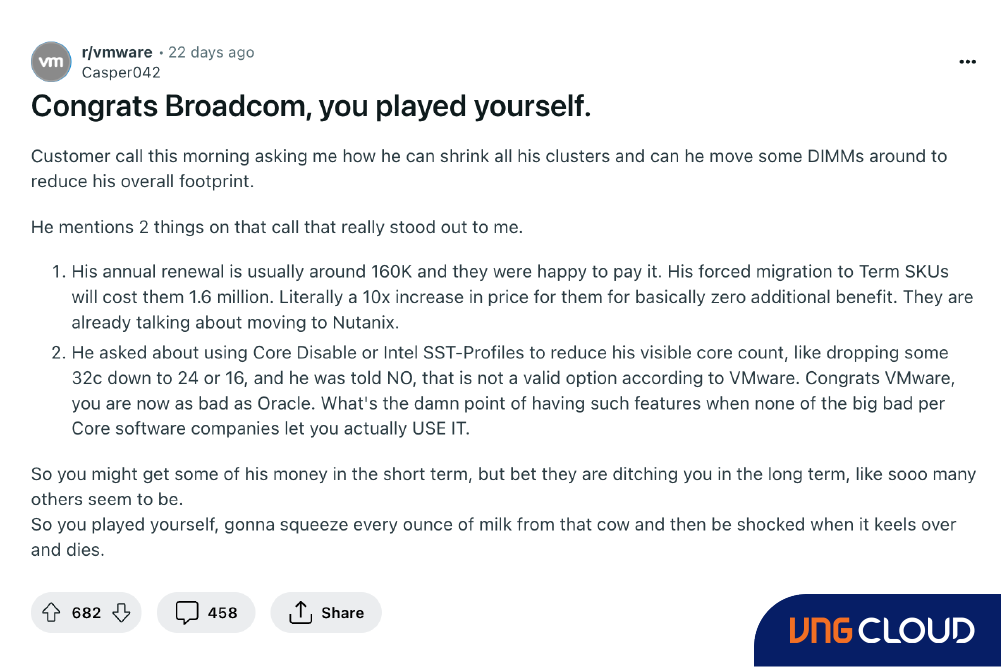
The termination of VMware's free ESXi hypervisor
The termination of VMware's free ESXi hypervisor by Broadcom has stirred significant reactions within the community and market. While some argue that the move may not have a substantial impact given the existing alternatives and the trend away from free editions in the industry, others see it as a clear signal that Broadcom is prioritizing larger customers over smaller ones.
Industry analysts suggest that this change could lead to a shift in adoption trends away from VMware, potentially benefiting competitors like Nutanix, Scale Computing, Microsoft with Hyper-V/Azure Stack, or Red Hat OpenShift Virtualization. Moreover, the decision to end perpetual licenses for VMware products in favor of a per-core subscription model has raised concerns among users, prompting some to explore cheaper alternatives or even revert to running workloads on bare-metal.
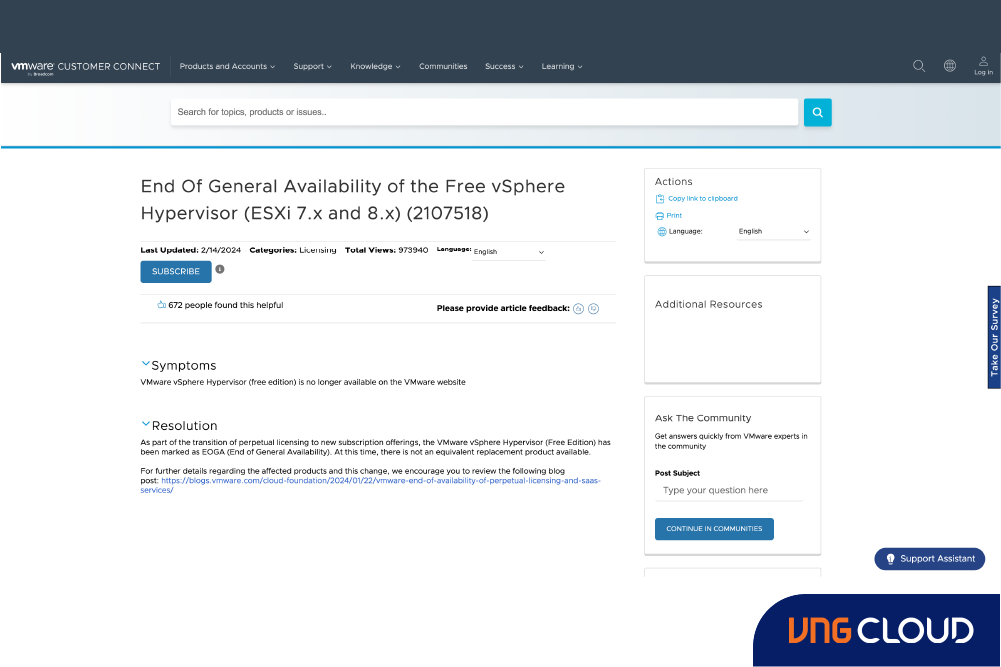
The end of free vSphere could hinder new VMware adoptions, potentially leading users to explore other options, impacting Broadcom's strategy. The free version of VMware served as a gateway for many individuals, particularly early in their careers, including numerous current CIOs, CTOs, and other professionals. With this option no longer available, newcomers are likely to seek alternative solutions, and Broadcom should recognize this trend. Despite this, Broadcom aims to rapidly boost VMware's profits.
vCloudStack - The alternative cloud solution for your VMware infrastructure
Amidst the notable policy changes from Broadcom affecting VMware, users are encountering uncertainties and new challenges when seeking to use bare-metal cloud services. In this context, VNG Cloud is an attractive and reliable alternative for organizations and enterprises.
One compelling reason to choose VNG Cloud as a replacement solution lies in the stability, modernity and reliability of the infrastructure. With a robust and closely managed server system, VNG Cloud commits to providing customers with a stable and secure operating environment.
Furthermore, VNG Cloud offers significant flexibility and scalability across its services. The ability to scale resources based on demand and easily expand or shrink operations enables organizations to adjust seamlessly to evolving business environments. This helps save costs and optimize operational efficiency without concerns about hardware upgrades or lengthy deployment times.
Particularly, you can choose vCloudStack by VNG Cloud as an alternative VMware vSphere. vCloudStack Hub serves as a private cloud platform facilitating the seamless integration of VNG Cloud services into clients' data centers. This empowers users to leverage VNG Cloud offerings and run applications with the cloud's inherent flexibility and innovation advantages, all while upholding data sovereignty and adhering to legal obligations.
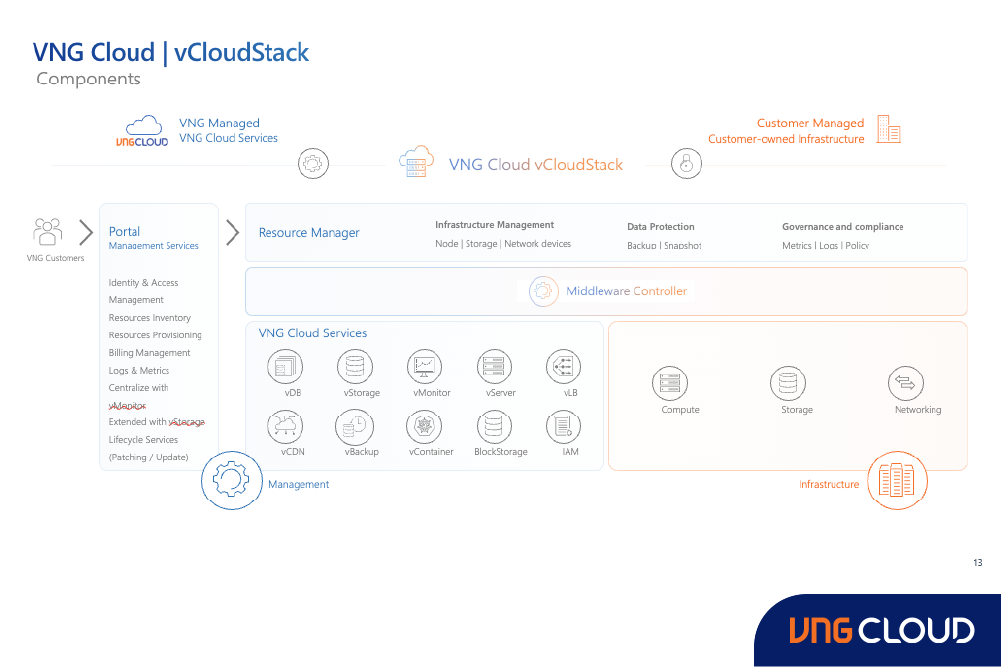
The benefits of choosing vCloudStack as an alternative to VMware vSphere:
- Significant cost savings: Save over 50% on license costs, reduce resource consumption for management, and enjoy complimentary upgrades.
- Comparable feature set: Offers equivalent functionality to 70% of VMware's features, including vCenter, vSphere, VRO, VRA, vSAN, and NSX.
- Open-source foundation: Built on open-source code, all functions are accessible through RESTful APIs, facilitating easy integration with third-party software and redevelopment.
- Streamlined architecture: Simple deployment, maintenance, and upgrades, with high scalability for sales.
- Data sovereignty: Ensuring data sovereignty and privacy by deploying on the customer's own on-premises infrastructure.
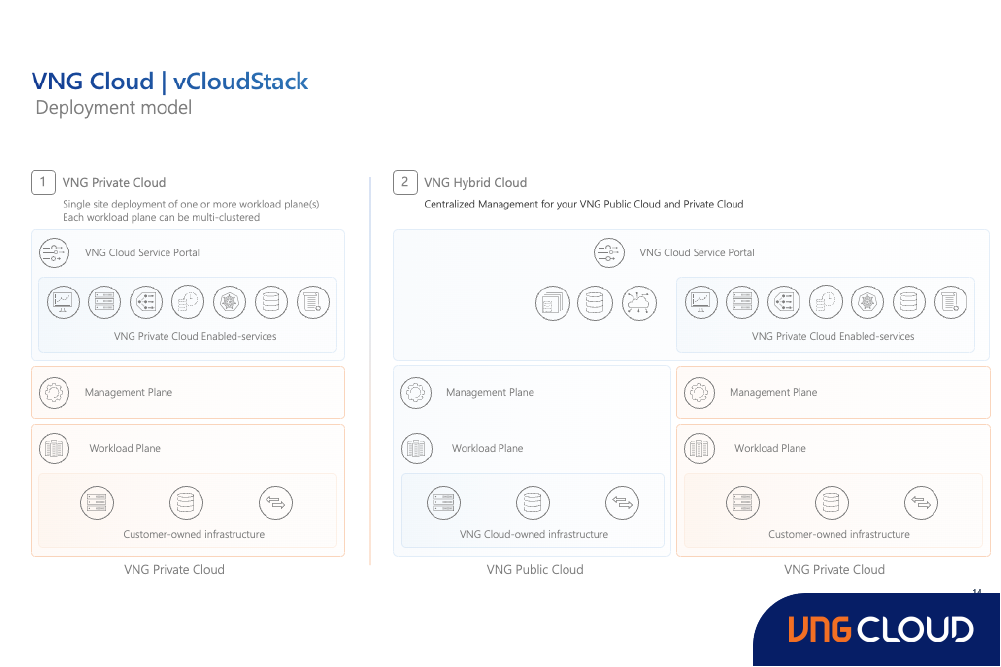
In summary, amid the changes in Broadcom's policies regarding VMware, VNG Cloud emerges as a top choice for organizations and enterprises operating in Vietnam that need a reliable and secure alternative for bare-metal server services. With stability, flexibility, and professional support, VNG Cloud makes the transition from VMware to a new platform easier and more convenient than ever before.